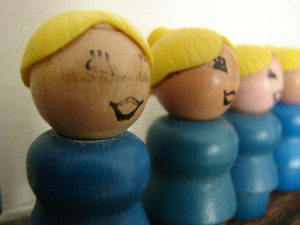This morning I received an apology, of sorts, from a machine. At the parking garage that runs between Center and Allston in downtown Berkeley, next to the YMCA, the ticket dispenser advises drivers, in an authoritative female voice, to press the button for a ticket. Then, as if she has told you a million times, in a mordant falling tone, she says, Take the ticket. Her ts are muffled, as if she is biting back on her temper.
When we drive into the garage, my husband, Raymond, and I shake off the chill by imitating her voice. “Take the ticket,” I will intone, as we circle up toward the second floor, and on the next ramp Raymond will toss it back to me, sliding to an even lower pitch: “Take the ticket.” Today at the garage entrance, though, something different happened. After “Take the ticket,” in an ecstatic sigh, as if a flock of doves had fluttered skyward, the machine voice uttered, “Welcome!”
I envision a conversation where the garage manager tells the ticket dispenser to improve her attitude and work on her customer service skills. Then, more realistically, I imagine someone clicking a box on a computer screen to activate “Welcome” in the repertoire. It’s an improvement, but still poor recompense for the loss of the outdoor attendant, who disappeared earlier this year, after the owners automated the garage. Every day from 4 to 7, this man, with his compact build, trim beard and zippered jacket, mediated between the pedestrians passing by and the cars rolling out of the garage.
Expertly turning, waving, beckoning with his right hand while raising the left in another direction to signal a stop, he kept the flow of traffic moving, maximizing efficiency, minimizing uncertainty and danger. Raymond and I encountered him as drivers but more often as walkers. “Yes,” he lilted when we hesitated on the sidewalk before crossing the entrance. “Yes, you can come.” He seemed to recognized many of the drivers and greeted almost every pedestrian. No matter how many times I passed him on the same day, he always offered an acknowledging nod.

I carry the memory of this man in my book of urban saints, which goes right back to the crossing guard who faithfully stood at the corner of Maple Avenue and Linden Street, throughout my early elementary school years. When I started kindergarten, her straight back and substantial build, sheathed in a navy blue uniform and topped with a police cap, made me think of the undulating, armless lathed wood body of the adult female figure from my toy family of Fisher-Price people. This was by no means a disrespectful comparison: like that cheerful blond mini-doll — or any good toy, for that matter — the crossing guard possessed a magical degree of consistency. She radiated a bully-free circle that stretched as far as she could see. Though she herself withheld her smile and shouted gruffly if a child set a toe off the sidewalk, she devoted unwavering attention to the well-being of everyone within her zone.
More recently, there’s a trainer at the Y, a tall, long-limbed man, also of substantial build. Despite–or because of–his size, he’s the staff member there who seems to best understand the mechanics of my solid but length-challenged body. With his help, I have reconfigured many of my settings on the weight machines there, relieving some untoward ankle and elbow stretching.
Beyond that, I don’t interact much with him, but I observe how he is with other people, advising them with gentleness and grace that I don’t find within myself. As is common among intermediate practitioners of any discipline, I find myself mentally scolding other users of the machines: Stop flapping your arms like that. You’re going to hurt yourself. Quit slamming the plates! Work with a weight you can actually handle.
I marvel at how the tall trainer can set people straight without evoking any shame. Try it slower, he’ll suggest, without a trace of superiority. I promise you you’ll get a lot more out of it that way. He calls people “my friend” — a phrase that could come across as condescending — in a tone that sounds perfectly genuine — because it is. He conveys a sense of acceptance toward others that must arise out of self acceptance. “This machine makes you feel like a gazelle,” I heard him tell someone he was showing an elliptical trainer. “It makes me feel like a gazelle, and I can tell you that doesn’t happen very often.”
My urban saints, for their mindfulness, humility, and generosity, win more admiration from me than achievements that are by typical measures more important. These individuals have connected with a capacity that we all have to heal and protect within a personal radius, recognizing tone of voice and choice of words as powerful forces for stability in a trouble-swept world.
